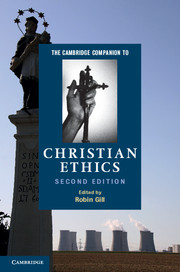Book contents
- Frontmatter
- Part I The grounds of Christian ethics
- 1 Making moral decisions
- 2 Moral traditions in eastern and western Christianity
- 3 The Old Testament and Christian ethics
- 4 The gospels and Christian ethics
- 5 The epistles and Christian ethics
- Part II Approaches to Christian ethics
- Part III Issues in Christian ethics
- Index
3 - The Old Testament and Christian ethics
from Part I - The grounds of Christian ethics
Published online by Cambridge University Press: 28 January 2012
- Frontmatter
- Part I The grounds of Christian ethics
- 1 Making moral decisions
- 2 Moral traditions in eastern and western Christianity
- 3 The Old Testament and Christian ethics
- 4 The gospels and Christian ethics
- 5 The epistles and Christian ethics
- Part II Approaches to Christian ethics
- Part III Issues in Christian ethics
- Index
Summary
OLD TESTAMENT OR JEWISH/HEBREW BIBLE?
In the past thirty years there has been a move in British and North American scholarship to use the term ‘Hebrew Bible’ (less often, ‘Jewish Bible’ or ‘Jewish scriptures’) in place of ‘Old Testament’. The question affects ethics, as will be shown shortly. The reason for the move has been a wish to be sensitive to Judaism, and to avoid the impression, undoubtedly created in many people's minds by the term ‘Old Testament’, that the books designated by this name are inferior to or superseded by those known as the New Testament. In addition, there has been the feeling in some quarters that the Christian term ‘Old Testament’ is inappropriate in academia.
It is easier to be sympathetic to the reasons for the move than to feel that the underlying problem has been satisfactorily dealt with. The terms ‘Jewish Bible’ and ‘Jewish scriptures’ most naturally refer to texts held sacred by and used distinctively within Judaism. They are legitimate designations in that context. ‘Hebrew Bible’ is more problematic, because, on analogy with ‘English Bible’, it most naturally refers to the Bible in Hebrew, although few students who take courses in the ‘Hebrew Bible’ in universities and colleges actually read it in that language. There is the further problem that ‘Hebrew Bible’ and ‘Old Testament’ are not synonymous. For the majority of Christians for most of the history of the church, ‘Old Testament’ has not only designated the twenty-four books of the Bible in Hebrew, but has also included the thirteen to sixteen books that Protestants call the Apocrypha, but which are scripture for the Roman Catholic and Orthodox churches.
- Type
- Chapter
- Information
- The Cambridge Companion to Christian Ethics , pp. 28 - 40Publisher: Cambridge University PressPrint publication year: 2011



